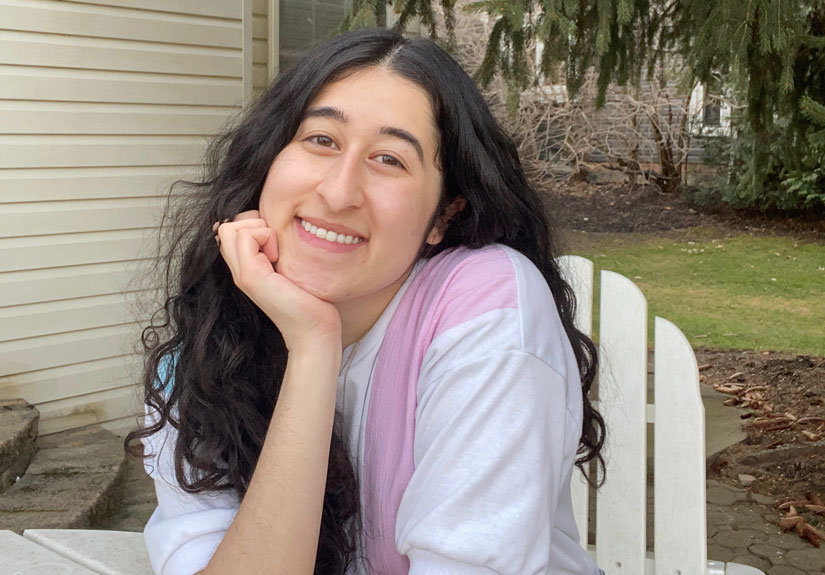Public Health Buckeyes: Monica Shah
Public health was the perfect fit for this environmental public health student

Meet Monica Shah, a fourth-year BSPH student in environmental public health. A Cleveland native, Shah first learned of public health as a high schooler — and she hasn’t looked back.
Why did you decide to pursue public health at Ohio State?
I’ve always been interested in science, health care and how different social factors affect health. As a junior in high school, I encountered the term “public health” while reading an article about the inequity of access to menstrual products, and from that point on, I knew it was the perfect field for me. I realized that the things I had been interested in — from infectious diseases to food access — all fit into public health.
I love the variety of classes offered in the program, and that I can customize my degree to fit my interests. I was drawn to the environmental public health specialization since it allowed me to combine life sciences and social sciences. Ohio State can feel large and intimidating, so I appreciate that the College of Public Health feels more personal and easier to navigate.
Can you tell us about your honors research thesis and capstone experience project?
I’m interested in better understanding COVID-19’s transmission and reporting accuracy. Working with professors Laura Pomeroy and Jiyoung Lee, I am modeling COVID-19 transmission in Columbus using wastewater surveillance data and state-reported cases. The data from wastewater treatment facilities helps provide information that reported cases may not capture. By the end of the project, I hope to better understand how transmission has changed during different phases of the pandemic and to gain more insight into the proportion of underreported cases.
Are you involved in any other academic, professional or student activities?
I’ve served as the events committee chair for the Public Health Student Leadership Council the past couple years, and I’m also on the executive board of Time for Change, which collaborates with other student organizations, university departments and businesses to plan Ohio State's annual Time for Change Week centered around environmental stewardship and sustainability. During my sophomore year, I worked as a COVID-19 contact tracer and case investigator for the university, which solidified my passion for public health.
Currently, I have an environmental health internship with Technoform, a materials company, and I’m also interning with the Columbus Asian Festival's Health and Wellness Committee. I also work at the Student Health Center during the school year. Last summer, I interned with Case Western Reserve University's Prevention Research Center for Healthy Neighborhoods and worked on a project to better understand the food landscape in Cleveland.
What’s something you wish more people knew about public health?
I wish more people were aware of how public health encompasses nearly every aspect of our lives. I think many people still only think about public health in terms of the pandemic. So many different factors — even those that may not be obvious right away — contribute to our health.
What are your goals after receiving your degree?
I plan to attend graduate school to continue to explore the intersection between the environment, animals and human health.
What advice would you give to students considering pursuing a degree in public health?
Public health can be applied to so many interests, and it's okay to come into college not knowing what specifically in public health you want to pursue. I’ve personally sought many different types of experiences throughout my undergraduate years to help me narrow my focus.
Don’t be afraid to put yourself out there and try new things. I know that can be hard, since I tend to be more introverted, but some of my best experiences have come from pushing myself outside my comfort zone.
What do you hope for the future of public health?
I hope that public health always puts people first. I hope that more people and organizations understand the value of public health and allocate more resources to it. As I continue my education and enter the workforce, I hope that public health professionals will work ethically to address complex issues and use their training to listen, support and uplift the communities they serve.
About The Ohio State University College of Public Health
The Ohio State University College of Public Health is a leader in educating students, creating new knowledge through research, and improving the livelihoods and well-being of people in Ohio and beyond. The College's divisions include biostatistics, environmental health sciences, epidemiology, health behavior and health promotion, and health services management and policy. It is ranked 22nd among all colleges and programs of public health in the nation, and first in Ohio, by U.S. News and World Report. Its specialty programs are also considered among the best in the country. The MHA program is ranked 5th and the health policy and management specialty is ranked 21st.